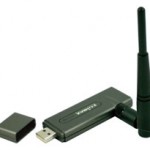Installing Edimax EW-7318 USB WLAN Adaptor on CentOS Linux
 Reproduced for the benefit of others who are attempting to get this USB Wireless LAN adaptor working on CentOS. The Edimax EW-7318 uses the RealTek chipset.
Reproduced for the benefit of others who are attempting to get this USB Wireless LAN adaptor working on CentOS. The Edimax EW-7318 uses the RealTek chipset.
Ralink RT2500 series chipsets are supported by the rt73usb/rt2500usb kernel drivers. A typical supported device is the Belkin Wireless G USB Network Adapter (RT2571F chipset). This device requires the rt73usb firmware which is currently available from http://elrepo.org
[root@shimla xen]# ifconfig wlan0
wlan0 Link encap:Ethernet HWaddr 00:1F:1F:31:C7:03
BROADCAST MULTICAST MTU:1500 Metric:1
RX packets:0 errors:0 dropped:0 overruns:0 frame:0
TX packets:0 errors:0 dropped:0 overruns:0 carrier:0
collisions:0 txqueuelen:1000
RX bytes:0 (0.0 b) TX bytes:0 (0.0 b)
The first step is to install the RealTek firmware from the Elrepo repository:
[root@shimla xen]# yum –enablerepo=elrepo install rt73usb-firmware
Loaded plugins: fastestmirrorError getting repository data for elrepo, repository not found
The repository cannot be found because the RPM is not installed. So install the RPM:
[root@shimla xen]# rpm –import http://elrepo.org/RPM-GPG-KEY-elrepo.org
[root@shimla xen]# rpm -Uvh http://elrepo.org/elrepo-release-5-3.el5.elrepo.noarch.rpm
Retrieving http://elrepo.org/elrepo-release-5-3.el5.elrepo.noarch.rpm
Preparing… ########################################### [100%]
1:elrepo-release ########################################### [100%]
[root@shimla xen]#
Now that the RPM is installed, download and install the RT73 firmware:
[root@shimla xen]# yum –enablerepo=elrepo install rt73usb-firmware
Loaded plugins: fastestmirror
Loading mirror speeds from cached hostfile
* base: mirror01.th.ifl.net
* elrepo: mirrors.coreix.net
* extras: mirror01.th.ifl.net
* rpmforge: apt.sw.be
* updates: mirror01.th.ifl.net
elrepo | 1.9 kB 00:00
elrepo/primary_db | 517 kB 00:00
Setting up Install Process
Resolving Dependencies
–> Running transaction check
—> Package rt73usb-firmware.noarch 0:1.8-5.elrepo set to be updated
–> Finished Dependency ResolutionDependencies Resolved
================================================================================
Package Arch Version Repository Size
================================================================================
Installing:
rt73usb-firmware noarch 1.8-5.elrepo elrepo 5.9 kTransaction Summary
================================================================================
Install 1 Package(s)
Upgrade 0 Package(s)Total download size: 5.9 k
Is this ok [y/N]: y
Downloading Packages:
rt73usb-firmware-1.8-5.elrepo.noarch.rpm | 5.9 kB 00:00
Running rpm_check_debug
Running Transaction Test
Finished Transaction Test
Transaction Test Succeeded
Running Transaction
Installing : rt73usb-firmware 1/1Installed:
rt73usb-firmware.noarch 0:1.8-5.elrepoComplete!
[root@shimla xen]#
At this point you can login to the X11 Gui and open a terminal. type “NetworkManager” and the card will initialise. You can then select the SSID and set any WPA/WEP key. TIP: Use the same password for your keyring manager as your login! (see later).
If you reboot at this stage, you will still not connect the the WLAN upon reload. You need to enable NetworkManager on startup:
chkconfig NetworkManager on
Now disable the network and wpa_supplicant services at boot time (NetworkManager now handles these):
chkconfig network off
chkconfig wpa_supplicant off
Now start NetworkManager now, without the need to reboot:
/etc/init.d/NetworkManager start
Useful hint: The request for the keyring password, when using NetworkManager, can be suppressed by using the pam_keyring package. The pam_keyring package can be obtained from the RPMForge repository:
http://wiki.centos.org/AdditionalResources/Repositories/RPMForge
I already had the RPM installed so it was just a case of entering:
yum install pam_keyring
Once pam_keyring was installed, view the contents of the “gdm” file:
cat /etc/pam.d/gdm
edit this file, adding “auth optional pam_keyring.so try_first_pass” and “session optional pam_keyring.so” in specific positions:
vi /etc/pam.d/gdm
i
auth optional pam_keyring.so try_first_pass
session optional pam_keyring.so
<esc>:wq
NOTE: The order in which this lines are placed in this file are important, here is a copy from a working system:
#%PAM-1.0
auth required pam_env.so
auth optional pam_keyring.so try_first_pass <—
auth include system-auth
account required pam_nologin.so
account include system-auth
password include system-auth
session optional pam_keyinit.so force revoke
session include system-auth
session required pam_loginuid.so
session optional pam_console.so
session optional pam_keyring.so <—
If your keyring password is different from your login password, you will still be prompted to enter it every time you login to your computer. I did warn you about this earlier. It’s possible to fix this but for my purposes, that’s as far as I will go now. I’m just happy the WLAN adaptor now works!
